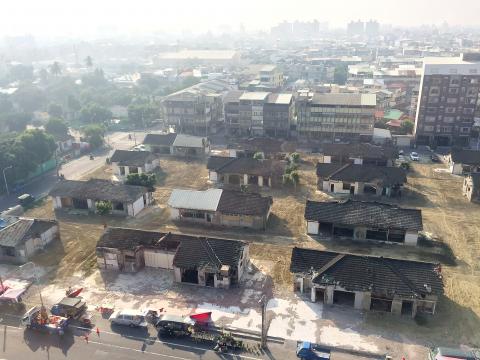The NT$1 billion (US$34.4 million) cost of restoring barracks at a Japanese-era military airport in Pingtung County is a major funding challenge, county officials said.
Over the past 10 years, 135 of the 149 airport barracks built by the Japanese in 1920 have been placed under the Cultural Heritage Protection Act (文化資產保存法).
“It’s not only about the artistic value of Japanese architecture — this is also about Taiwan’s aviation history,” former barracks resident Yeh Ching-yuan (葉慶元) said.

Photo: Lo Sin-chen, Taipei Times
The airport was built to meet the defense needs of the Japanese government, and family barracks for the families of Imperial Japanese Army Air Service officers were built between 1927 and 1937.
The airport and barracks were taken over by the Republic of China Air Force after World War II, with the families of air force and army officers living there in the years that followed.
The county government in 2007 listed 71 buildings from the Shengli (勝利) and Chongren (崇仁) military dependents’ villages as cultural heritage sites, following demands from conservationists.
Last year, 64 additional buildings from Shengli, Chongren, Sianguang (憲光) and Desheng (得勝) villages were also added to the list by the county’s Cultural Affairs Bureau.
The 135 barracks represent the largest collection of Japanese-era living quarters in one spot anywhere in the country, Pingtung Citizen Association secretary-general Chou Jui-yu (周芮宇) said.
The act has been crucial in saving these and other historic buildings throughout the country, as it stipulates that buildings older than 50 years on public land must undergo evaluation by authorized officials, she said.
The county needs to attract more talented officials to effectively manage the properties, she said, adding that thieves had already broken into the barracks at Desheng, stealing pillars and door frames.
Work on the first 71 buildings to be listed progressed at a snail’s pace due to lack of funding, but began to pick up last year after receiving provisions from the Forward-looking Infrastructure Development Project, she said.
The county plans to complete restoration work on the first 20 buildings this year at an estimated cost of NT$100 million, with the remainder expected to be finished by next year through an injection of NT$485 million from the Ministry of Culture, she said.
The bureau said it is not planning to restore all of the 64 most recently listed buildings, citing extensive damage to some of them.
Those that are to remain unrestored would be protected in their current state, which would cost the county significantly less money, the bureau said, adding that it would apply to the central government for financial assistance in protecting the buildings.

ANOTHER EMERGES: The CWA yesterday said this year’s fourth storm of the typhoon season had formed in the South China Sea, but was not expected to affect Taiwan Tropical Storm Gaemi has intensified slightly as it heads toward Taiwan, where it is expected to affect the country in the coming days, the Central Weather Administration (CWA) said yesterday. As of 8am yesterday, the 120km-radius storm was 800km southeast of Oluanpi (鵝鑾鼻), Taiwan’s southernmost tip, moving at 9kph northwest, the agency said. A sea warning for Gaemi could be issued tonight at the earliest, it said, adding that the storm is projected to be closest to Taiwan on Wednesday or Thursday. Gaemi’s potential effect on Taiwan remains unclear, as that would depend on its direction, radius and intensity, forecasters said. Former Weather Forecast

As COVID-19 cases in Japan have been increasing for 10 consecutive weeks, people should get vaccinated before visiting the nation, the Centers for Disease Control (CDC) said. The centers reported 773 hospitalizations and 124 deaths related to COVID-19 in Taiwan last week. CDC Epidemic Intelligence Center Director Guo Hung-wei (郭宏偉) on Tuesday said the number of weekly COVID-19 cases reported in Japan has been increasing since mid-May and surpassed 55,000 cases from July 8 to July 14. The average number of COVID-19 patients at Japan’s healthcare facilities that week was also 1.39 times that of the week before and KP.3 is the dominant

The Chinese Communist Party’s (CCP) working group for Taiwan-related policies is likely to be upgraded to a committee-level body, a report commissioned by the Mainland Affairs Council (MAC) said. As Chinese President Xi Jinping (習近平) is increasingly likely to upgrade the CCP’s Central Leading Group for Taiwan Affairs, Taiwanese authorities should prepare by researching Xi and the CCP, the report said. At the third plenary session of the 20th Central Committee of the CCP, which ended on Thursday last week, the party set a target of 2029 for the completion of some tasks, meaning that Xi is likely preparing to

US-CHINA TRADE DISPUTE: Despite Beijing’s offer of preferential treatment, the lure of China has dimmed as Taiwanese and international investors move out Japan and the US have become the favored destinations for Taiwanese graduates as China’s attraction has waned over the years, the Ministry of Labor said. According to the ministry’s latest income and employment advisory published this month, 3,215 Taiwanese university graduates from the class of 2020 went to Japan, surpassing for the first time the 2,881 graduates who went to China. A total of 2,300 graduates from the class of 2021 went to the US, compared with the 2,262 who went to China, the document showed. The trend continued for the class of 2023, of whom 1,460 went to Japan, 1,334 went to